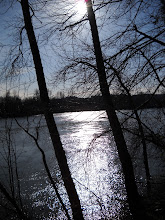ISLANDERS, the new YA
novel by John Barlow
My first YA novel,
ISLANDERS, is out today. It took quite a few years to write, and I almost
didn’t publish it. At various times over the last few years I thought it was finished, only to return the manuscript
to a drawer and wait. I don’t know why, really. I never even showed it to my
agent.
Inevitably, things
started to get in the way--work, other books, kids, life--but something always
told me to hang onto this novel and give it some time. I never stopped thinking
about it, wondering how to improve things, to perfect its dystopian world and make
the plot-arc that runs through it compelling. I knew the story itself was good,
but I also knew it still needed some work.
Early this year I had
a little free time, so I got ISLANDERS out and read it again. It was better
than I remembered. So I decided to re-write it, taking bits out and tightening
the storyline, making the action a little faster and the characters work off
each other more effectively. After that I uploaded it to my Sony Reader and sat
down to read it as a novel, in one go. I really
liked it. Then, on a whim, I sent it to all the YA-aged people I knew. The
response was good, and I began to wonder whether I should in fact publish it.
I did another re-write
(yes, I like re-writing) and got more opinions. Even my parents liked it. My
dad said he felt embarrassed how much he enjoyed a novel for people 60 years
his junior! That was the clincher. If a seventy-five year-old ‘young adult’
liked it, perhaps it was ready. I sent a synopsis to a cover artist I know and
asked him to see what he could do. The result is, I think, stunning.
So that’s the story
behind ISLANDERS. Zia also suggested that I include some details about how I
write. Well, I’ve been pretty much a full-time writer since 2004, writing my
own books, as well as working as a ghostwriter, journalist and translator on
the side. ‘Full-time’, then, really means ‘literary dogsbody’. This week, for
example, I have been:
Working sporadically
on my latest crime novel;
Researching an article
on cheese makers (I write for a food magazine);
Writing an article
about an art project I’ve been involved with (I’m the ghostwriter on the
project);
Translating an
academic study on aspects of the history of English.
Somewhere in there I
should have been planning the next ISLANDERS book, but there just hasn’t been any
time. When it comes to a daily routine, I’m lucky that I don’t have a day job,
and that I can prioritize my work according to what really needs doing. That
means clocking on at 9.15am (after taking the kids to school) and working
through until about 2pm. After lunch I might have boy-sitting duties, but
otherwise I’ll work through until about 7pm. If I can manage anything after
supper, it’ll be revision, often using my Sony Reader. Every day is the same,
unless I’m off travelling; next week, for example, I’ll be visiting cheese
makers at some point.
*
Anyway, that’s how
ISLANDERS was written. No rush, no push. Every day more or less the same.
The novel is an
adventure. Ben Brewer has lived all his life on an island, with his mother and
a community of people who escaped the ravages of war in search of somewhere
safe. Ben’s father was a war hero, but he was killed before Ben was born, fighting
for freedom (a cause which was lost).
When a young messenger
arrives on the island saying that Ben’s father is not dead, Ben decides to go and find him, taking four friends with
him. Perhaps his dad is in danger. But Ben is 13 and his dad has been gone all
those years. Why did he never come back home to see his own son?
They journey to the
Mainland, a post-war landscape where germ warfare has destroyed much of the
natural order, leaving a weird world of genetic mutants. There are still some
humans around, but they’re not doing very well, enslaved in an industrial
dystopia that condemns them to a life of mindless drudgery. It’s a world gone
mad, with one man controlling everything. This tyrant, Jack Sullivan, was the
bitterest enemy of Ben’s father, and he holds they key to what really happened
during the war. He also desperately wants to discover where the Island is. Ben
has to try and find his dad without leading Sullivan back home.
If you like your
animals mutant, and your heroes young, smart and brave, ISLANDERS might just be
for you. After all, my dad liked it.
John Barlow
ISLANDERS is available at all major
ebook retailers, and is on special introductory offer (99cts) through November
2012 at Amazon (US,
UK)
and Kobo.
Where to buy:
Amazon
Amazon UK
Kobo
Where to buy:
Amazon
Amazon UK
Kobo
John can be found at:
Website: http://www.johnbarlow.net
Mailing list:
mailinglist@johnbarlow.net
Facebook page:facebook.com/john.barlow.319
Goodreads author page:
http://www.goodreads.com/JohnBarlow
Twitter: @John_Barlow_LS9






